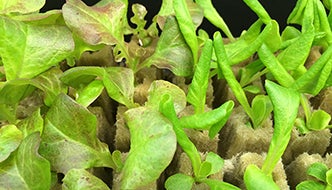Growing food year-round is not a new concept. Today, researchers are exploring a sustainable way to increase access to locally grown food through urban farming, which fosters the growth or production of food in a city or heavily populated town or municipality. Recently, the Lighting Enabled Systems & Applications (LESA) center at Rensselaer Polytechnic Institute and the Controlled Environment Agriculture (CEA) team at Cornell University were awarded a three-year $2.42 million grant from the National Science Foundation through the organization’s new funding initiative called “Innovation at the Nexus of Food, Energy and Water” (INFEWS). The awarded research project, Strategic FEW and Workforce Investments to Enhance Viability of Controlled Environment Agriculture in Metropolitan Areas, will develop a multidimensional toolkit to guide the development of a metropolitan-based CEA.
According to the research team, controlled environment agriculture (CEA), such as greenhouses or plant factories, may provide an alternative to conventional systems of field-based production and long-distance transportation to supply metropolitan areas with locally grown vegetables. Potential benefits of metro CEAs include decreased transportation of the food, reduced water use compared with field-based production, economic growth, new jobs, and workforce development.
Tessa Pocock, a global expert on photobiology and relationships between lighting and plant physiology who serves as a senior research scientist at LESA, will lead the work at Rensselaer. The growth systems, operating guidelines, and workforce development programs that will be developed in this research is part of a broad collaboration between LESA and Cornell University exploring the future of advanced CEA systems as part of advancing sustainable urban food supplies. “Through the RPI and Cornell partnership, this research addresses many challenges currently being faced by metropolitan food producers. We look forward to utilizing advanced technologies to increase resource use efficiency across the urban farming industries,” said Pocock.
Pocock will work on the effect of LED light programs on water use efficiency and nutrient content of crop plants. In parallel, Marianne Nyman, associate professor in the Department of Civil and Environmental Engineering at Rensselaer, will work on developing new methods for assessing plant nutrient content to quantify CEA growth system performance.
“I look forward to being a part of this exciting project in advancing the field of urban farming research by inventing new analytical measurement methods for selected xanthophylls (nutrients), as these types of standards are very expensive for general use,” said Nyman. “The collaboration with researchers from RPI and Cornell will create opportunities for us to also evaluate novel systems to optimize economic benefits as well as water, energy, and other resource use efficiencies in CEA vegetable production.”
Pocock and Nyman will also work with a team of CEA experts led by Neil Mattson, the lead investigator of GLASE at Cornell and associate professor in the Horticulture Section of the School of Integrative Plant Science at Cornell on CEA economic modeling, system design, and workforce development that will advance the future of metropolitan food production.
“I’m excited about this project’s partnership with RPI and Cornell University to further explore the capacity and challenges for urban agriculture producers to provide nutritious, local, year-round food for consumers,” said Mattson. “By putting all these pieces together—including energy, water, workforce development, and economic viability—we hope to discover if CEAs makes sense for producing food for the masses.”
The INFEWS research project will also provide research experience research experience to several graduate students, and several undergraduate students who will have an opportunity to participate in summer internship experiences with CEA industry members. Workforce development training, including online curricula and in-person short courses, will contribute to the professional development of potential metro CEA employees.
The recent award augments the systems that will be developed by a public-private consortium called GLASE—The Greenhouse Lighting and Systems Engineering Consortium, led by researchers at Cornell University and Rensselaer that was launched this past summer, to transform the way greenhouses operate in order to reduce electricity use by 70 percent.
The seven-year, $5 million project funded by the New York State Energy Research and Development Authority will advance Governor Andrew M. Cuomo’s Clean Energy Standard that aims to have 50 percent of electricity come from renewable energy sources by 2030.



